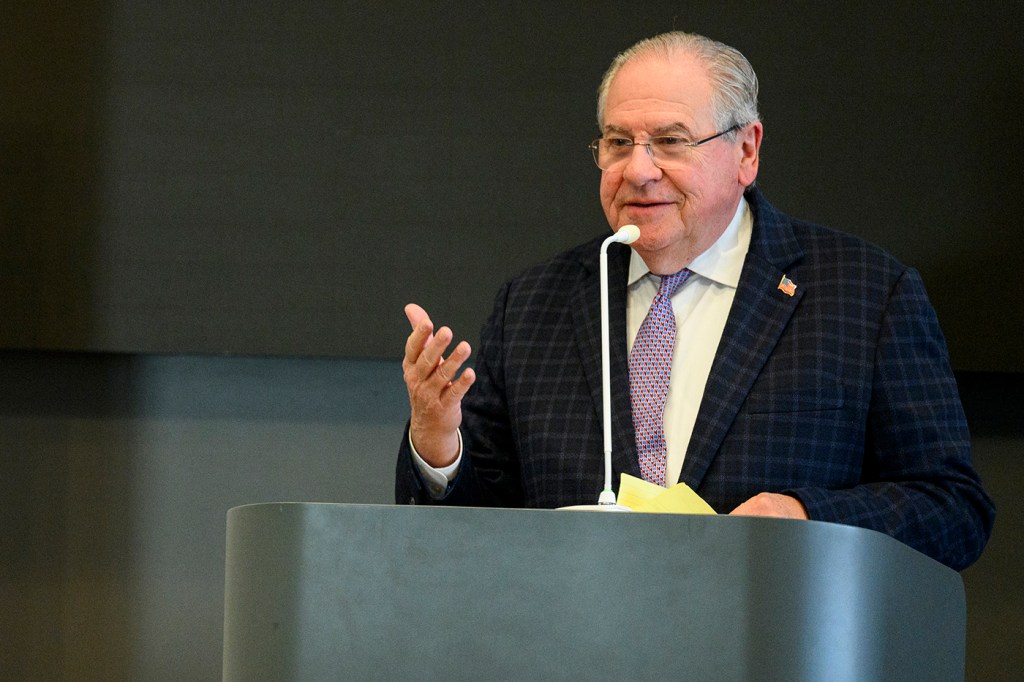Bob DeLeo’s five lessons on how to build consensus in government
Now a Northeastern University Fellow for Public Life, DeLeo spent 12 years as the Massachusetts House speaker.

During his many years as Massachusetts House speaker, Robert DeLeo had a nickname that would follow him even after his lengthy career in public service concluded: “master of consensus.”
For those who know and who’ve worked with DeLeo, now a Northeastern University Fellow for Public Life, it is a fitting moniker. As the House speaker for 12 years, DeLeo is the longest-surviving politician to hold the role. During his tenure, he oversaw and helped shepherd reforms to state gun laws, a minimum wage increase and a transgender rights bill, among other achievements.
Those legislative milestones are a testament to DeLeo’s ability to corral members of both political parties, facilitate dialogue and push the process forward. But DeLeo admits that presiding over a legislature in an overwhelmingly blue state like Massachusetts — and, he adds, at a time when compromise was still possible — helped to burnish his image as the state’s storied consensus-broker.
“I looked at my role as the speaker as one in which I don’t want to play games,” DeLeo said, speaking during a recent “How Government Works” conversation hosted by Northeastern.
“I don’t want to dance, politically or otherwise, I just want to find out what’s best and move forward,” he said.
Politics can be rough and tumble; but DeLeo understood how to steer the ship in Massachusetts, to lasting results. Here are five lessons from his time in government.
1. Be who you are
In addition to representing a district, the job of speaker is to convene committees, appoint committee chairs, set the House agenda and manage the flow of legislation. It’s admittedly a lot for one person to handle.
“I started off as a psychology major here at Northeastern, and I sometimes wish I had gotten my psychology degree instead of a political science degree, knowing what I know now,” DeLeo said.
In other words, he said, the business of the legislature is about understanding people — including oneself: “You have to be who you are, number one, and number two, you have to do what you think is best.”
Editor’s Picks
2. Find common ground
As a lifelong Democrat, DeLeo managed to reach across the aisle on many occasions during his more than 30 years in government. “I made it a point to work with anybody,” he said.
And as Massachusetts was led by a Republican governor for nearly half of DeLeo’s tenure as speaker, his bipartisan approach became a strategic necessity. It goes without saying that government functions best when members of opposing parties put their differences aside and can come together.
To do that, DeLeo likes to take the politics out of politics — thinking about it, instead, as a job they’d be hired to do. And, as with any job, you have to talk to your colleagues to get things done.
It all starts with an invitation: “You feel this way, you feel that way, so come on in and let’s talk about it,” he said.
3. Build relationships through listening
At the heart of effective governing is the ability of any elected representative to connect with different constituencies. Every community faces a set of issues, so it follows that every elected representative brings something slightly different to the table, DeLeo said.
“You’re dealing with 159 other people, all of whom were elected to their particular district, and all of whom, depending on their district, come with different concerns,” DeLeo said.
As a follow-on to his point about finding common ground, DeLeo emphasized soft skills, such as listening and building a rapport with colleagues and constituents alike by identifying with and validating their concerns.
“I can’t tell you how many times I was out west in the Berkshires, visiting various farms and tobacco farms, and how those folks look at things a little bit differently than us here in Boston,” DeLeo said.
4. Assert leadership when necessary
Of course, in an age of divided government, not everything can be accomplished through consensus.
“On the gun issue, when I thought the committee wasn’t going to release a report favorable to our cause, I said, that’s too big a bill, it’s too important to the people of the commonwealth, and it’s too important to the nation,” DeLeo said.
“They have to know that there is someone in charge who has to set the agenda,” he said.
5. Conflict is inevitable
In every state, at all levels of government, “you’re going to have squabbles,” DeLeo said. Bills will come all the way through the process only to be defeated; compromises won’t be reached.
Politics, of course, is about the long game: there will be victories and defeats throughout, DeLeo said.
“I think fortunately for us [in Massachusetts], especially with the passage of the economic development bill at the end of this last session — I think that was a great sign of getting some of the important stuff done,” he said.





